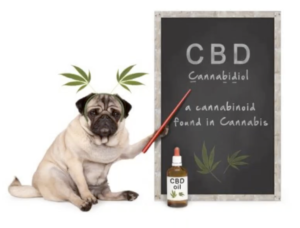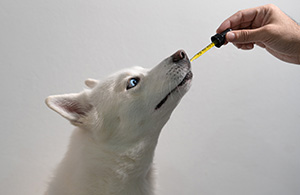From Dr. Oz to Oprah, articles and CBD products are cropping up every day boasting of the health and wellness benefits in both humans and pets. What is confusing for most pet owners is that if there is a product on the market that can help to make their pets well, why isn’t every Veterinarian talking about it?
CBD products for pets is a growing market with a whole list of benefits for our furry friends, but it also carries changing laws and restrictions that your Veterinarian must adhere to as a medical professional. This article will discuss some of the most common questions and concerns about CBD that pet owners are asking. It will give you some basic facts and benefits, then, if you think you want to know more, we will give you a source to dive deeper.
What is CBD?
CBD, or cannabidiol, is a compound found in both the cannabis and hemp plants. And because they come from two different plant sources, you will have some slight variations, but luckily, both CBD products will provide your pet with an abundance of wellness benefits.
The main difference is THC. Delta-9-tetrahydrocannabinol (THC) is the compound that gives marijuana its psychoactive properties. Most CBD does not contain THC at all, and if it does, it will have trace amounts. That is because most CBD products are derived from hemp and not from marijuana, so you can be reasonably sure that THC is not going to be an issue.
Understanding what CBD can do for your pet’s wellness is easier if you know what CBD is and how it is used. What scientists know is that cannabinoids (CBD) interact with the endocannabinoid receptors located in the central and peripheral nervous systems in our bodies.
What these receptors do is to help maintain balance in the body and keep it in a normal healthy state. Like many remedies that we offer our pets, we don’t know if what we are giving them is helping to alleviate their pain or not. But since human and pet endocannabinoid receptors are similar, by looking at how CBD works with humans to relieve pain, you may find comfort in knowing that we can help our pets something to feel better too.
Is CBD Safe For My Pet?
For safety issues, we start by turning to a  professional. Dr. Zac Pilossoph, a nationally recognized veterinary medical professional, who recently did a training with the CBD Training Institute, is a Veterinarian and leader in the cannabis education and innovation space. He understands that the medical profession is restricted in sharing much of the information on CBD for pets. Why is that? According to Dr. Pilossoph, the American Veterinarian Council “prohibits a licensed veterinarian from dispensing or administering cannabis or cannabis
professional. Dr. Zac Pilossoph, a nationally recognized veterinary medical professional, who recently did a training with the CBD Training Institute, is a Veterinarian and leader in the cannabis education and innovation space. He understands that the medical profession is restricted in sharing much of the information on CBD for pets. Why is that? According to Dr. Pilossoph, the American Veterinarian Council “prohibits a licensed veterinarian from dispensing or administering cannabis or cannabis
products to an animal patient.” ( https://vmb.ca.gov/ ) Even though the 2018 Farm Bill loosened the restrictions on hemp-derived CBD, removing it from the Schedule I designation, restrictions on the ability of veterinarians to discuss, recommend, and prescribe CBD for pets still exists. Despite the limitations, the AVC always encourages pet owners to review CBD use with their Vets because they are allowed to discuss the facts relevant to their own pet’s health.
How Does CBD Work?
What scientists know is that cannabinoids (CBD) interact with the endocannabinoid receptors located in the central and peripheral nervous systems that our bodies have. These are the systems that help maintain balance in the body and keep it in a normal healthy state.
CBD is a compound found in both cannabis and hemp plants. The main difference is in the THC. Delta-9-tetrahydrocannabinol (THC) is the compound that gives marijuana its psychoactive properties. I am sure that you have heard stories about people who blow marijuana smoke in their dog’s face to get them high, well, this not like that all! The reason for this is that hemp CBD has very little to no THC. Hemp CBD oil is non-psychotropic, and to be legal, it must contain less than 0.3% THC (which is far, far below the amount needed to induce any mind-altering effects).
What Are The Benefits Of CBD For My Pet?

Pet owners have indicated that consistent use of CBD can help in the treatment of certain types of seizures, to control pain, inflammation, nausea, vomiting, to stimulate their pet’s appetite, and to manage anxiety—something that will come in handy around the 4th of July!
Because of its anti-inflammatory properties, CBD has benefits that are already present when taken by humans to alleviate pain and discomfort. We know that human and pet endocanabidiol systems are similar; it wouldn’t be a stretch to assume that what makes humans well may also make our best friends feel better too.
The benefits are the most exciting aspects of CBD to consider. According to most medical professionals, the benefits of CBD for our pets include anti-nausea, appetite stimulation, anti-anxiety, certain cardiac benefits, and for many, there have been anti-cancer benefits as well. Just remember that there have been no specific medical trials on pets to support these claims, just plenty of first-hand testimonials to support its use in the well-being of pets.
What Are the Side Effects of CBD?
Here lies the gray zone that is CBD, something that makes medical professionals very uneasy when talking about its use for our pets. Without access to specific trials on pets, it best to take a look at the potential side effects for your dog or cat based on how CBD affects humans.
Some potential side-effects to look for:
- Dry mouth
- Lowered blood pressure
- Drowsiness
Risks—to minimize any potential risks, start by following the correct dosing on the package. Many pet CBD users find it helpful to keep a log of dosage so they can monitor any changes.
What Should I Look For When Buying CBD?
Always check the labels! Like any good pet parent, you want to make sure that you are giving your animals the best quality products for their health and wellness. Do you price shop when it comes to your health? Well, then consider that higher-quality CBD may cost more.
Just start by reading the label.
Ask yourself: Is this product free of additives and toxic substances such as pesticides, herbicides, or heavy metals?
The easiest way to determine what is inside a CBD product is to read the Certificate of Analysis or COA. The manufacturer should provide a certificate that tells you the amount of CBD that is in the product along with any applicable testing required by the state. Many CBD companies go beyond the minimal requirements to test for a variety of chemicals and additives, so do your due diligence when giving these products to beloved pets.
Also, many CBD products contain only small amounts of CBD. You want to make sure that what you are buying is the real thing. Again, read that COA to be sure that you are getting what you paid for is CBD!
How Do I Choose?
You will notice that CBD for pets comes in a variety of products. Oils and treats are the two most common ways to get CBD in your pet.
Although there is no scientific evidence pointing to one method over another, say oils vs. treats, you want to consider the dosing again. With CBD oils, you have a more natural way to give your pet a wellness treatment without fillers or sugars present. Of course, if your pet is partial to treats over a dropper full of oil, by all means, give them what they need in the way your pet will take it comfortably.
CBD is Both Legal and Safe
With so many new studies coming out about the benefits of CBD, the most encouraging news is that CBD appears to be safe for our pets to take, even when taken in high doses and over long periods.
CBD oil and treats for pets that come from the hemp plant are legal in all 50 states so that you can rest easy about that. Plus, CBD derived from hemp plants will contain none or very little traces of THC. The bottom line is that CBD oil can be healthy and even lifesaving, depending on the needs of your pet.
Your Next Steps
 As you can see, CBD is a new wellness treatment that you may want to consider for your pet, whether they are experiencing symptoms like separation anxiety or even more severe conditions for which nothing else has worked.
As you can see, CBD is a new wellness treatment that you may want to consider for your pet, whether they are experiencing symptoms like separation anxiety or even more severe conditions for which nothing else has worked.
You should not ever expect CBD to be a panacea, but it may be able to put your pet on the road to wellness and recovery for some illnesses or anxiety they are experiencing. At the very least, CBD may help relieve some of your pet’s symptoms and make life easier for you and your pet overall. Many pet owners today are happily using pet CBD to help their animals live a healthier life than he or she otherwise might experience.
So, if you’re interested in trying CBD for your dog, cat, or even your horse, here are some final reminders:
- Talk to your Vet first. Many Vets do have information on pet studies.
- Start Slow. Many CBD pet products allow you to dose small – 1 mg of CBD per 10 lbs of body weight is an accepted dosing standard for pets. Start here and keep track of your pet’s reaction.
- Stay with your pet for 2-3 hours after giving them CBD for the first time. While CBD is non-toxic, it’s always a good idea to keep an eye on your pet after introducing something new to their diet.
- Learn more: Education on the use and benefits of CBD products for pets is a growing industry.
Want to learn more about Pet CBD? Get the facts
Maria Bereket is a pet owner, speaker, trainer, and marketing professional based in Southern California. She learned about CBD for pets when her 12-year old cat went into kidney failure. Adding daily doses of CBD, Maria was able to ease her cat’s discomfort and prolong her life pain-free. She recently taught a class on Instagram for CBD Businesses with the CBD Training Academy.

